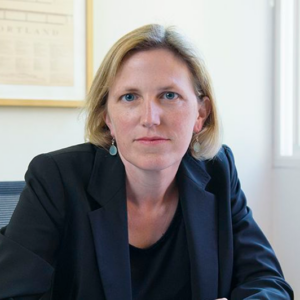Excessive market power by dominant corporations is widely decried across the political divide. Federal and state antitrust agencies have begun to reclaim their rightful roles in checking the power of a few firms to control so much of the economy. Historically, tax policy complemented these antitrust enforcers by leveling the economic playing field. Yet today, taxation remains overlooked both as a driver of current levels of market concentration and as a tool to remedy the problem.
Roosevelt’s Taxing Monopolies series explores how a rewriting of the tax code can work alongside other antimonopoly tools to curb the excessive economic and political power of large corporations and their owners.
On April 18, 2024, the Roosevelt Institute hosted a virtual roundtable discussion with a multidisciplinary circle of authors who presented their latest research on how the US tax code affects market concentration and how to reform the tax code.
In Conversation
Senator Elizabeth Warren
Senator (MA)Elizabeth Warren, the senior Senator from Massachusetts, is a fearless consumer advocate and one of the nation’s leading progressive voices, fighting for big structural change that would transform our economy and rebuild the middle class. Before becoming the first woman ever elected to the Senate from Massachusetts in 2012, Elizabeth led the fight to create the Consumer Financial Protection Bureau, an agency established in the aftermath of the financial crisis to protect consumers from predatory financial practices. Elizabeth lives in Cambridge, Massachusetts, with her husband Bruce and their golden retriever, Bailey.
Prof. Reuven Avi-Yonah
Irwin I. Cohn Professor of Law, University of Michigan
Prof. Reuven S. Avi-Yonah is the Irwin I. Cohn Professor of Law and director of the International Tax LLM Program at the University of Michigan. He specializes in corporate and international taxation and has served as a consultant to the US Department of the Treasury and the Organisation for Economic Co-operation and Development (OECD) on tax competition. In addition to prior teaching appointments at Harvard University (law) and Boston College (history), he has practiced law with Milbank, Tweed, Hadley & McCloy in New York; with Wachtell, Lipton, Rosen & Katz in New York; and with Ropes & Gray in Boston. He has published more than 250 books and articles, including Advanced Introduction to International Tax Law (Elgar, 2019), Global Perspectives on Income Taxation Law (Oxford University Press, 2011), and International Tax as International Law (Cambridge University Press, 2007). He has written extensively on the historic and contemporary linkages between competition and tax policy, including with “Antitrust and the Corporate Tax, 1909–1928” and “A New Corporate Tax”.
Prof. Kimberly Clausing
Eric M. Zolt Chair in Tax Law and Policy, UCLA School of Law
Prof. Kimberly Clausing is the Eric M. Zolt Chair of Tax Law and Policy at UCLA School of Law. During the first part of the Biden Administration, Clausing was the Deputy Assistant Secretary for Tax Analysis in the US Department of the Treasury, serving as the lead economist in the Office of Tax Policy. Prior to UCLA, she was the Thormund Miller and Walter Mintz Professor of Economics at Reed College, where she taught international trade, international finance, and public finance. Her research studies the taxation of multinational firms. Clausing received her B.A. from Carleton College and her M.A. and Ph.D. from Harvard University—all in economics. Her latest article, “Capital Taxation and Market Power” considers the relationship between market power and capital income, and suggests important implications for optimal capital taxation design, including the role of entity taxation, the use of graduated business tax rates, and international tax reform.
Dr. Sandy Hager
Senior Lecturer in International Political Economy, City University of London
Dr. Sandy Hager is a political economist in the Department of International Politics at City, University of London, as well as a Fellow at Common Wealth think tank. His book Public Debt, Inequality, and Power: The Making of a Modern Debt State was published in 2016 by the University of California Press. Hager recently co-authored with Dr. Joseph Baines, “Does the US Tax Code Encourage Market Concentration? An Empirical Analysis of the Effect of the Corporate Tax Structure on Profit Shares and Shareholder Payouts,” a Roosevelt issue brief which finds that the US tax structure plays a crucial but still underappreciated role in exacerbating the monopoly problem.

Niko Lusiani
Director, Corporate Power, Roosevelt Institute [Moderator]
Niko Lusiani directs the corporate power program at the Roosevelt Institute, focused on corporate governance, competition policy and corporate tax. He brings over 15 years of research, public and shareholder advocacy. Before Roosevelt, he played a key role in defining Oxfam’s economic inequality research agenda – especially knitting together different strands on corporate tax, corporate governance as well as racial, gender and economic inequalities. He also led the organization’s engagement with pharmaceutical companies around corporate tax and vaccine equity during the early stages of COVID-19. A frequent contributor to debates on tax, corporate governance and economic inequality, Niko’s work has been widely featured in the Financial Times, the Washington Post, NPR, Newsweek, VICE and the LA Times. He is the editor of Roosevelt’s Taxing Monopolies series, and recently co-authored with Emily DiVito, “Concentrated Markets, Concentrated Wealth: Billionaire Blockholders, the Interlocking Rise of Wealth and Market Concentration, and the Role of the US Tax Code” as part of that series.



